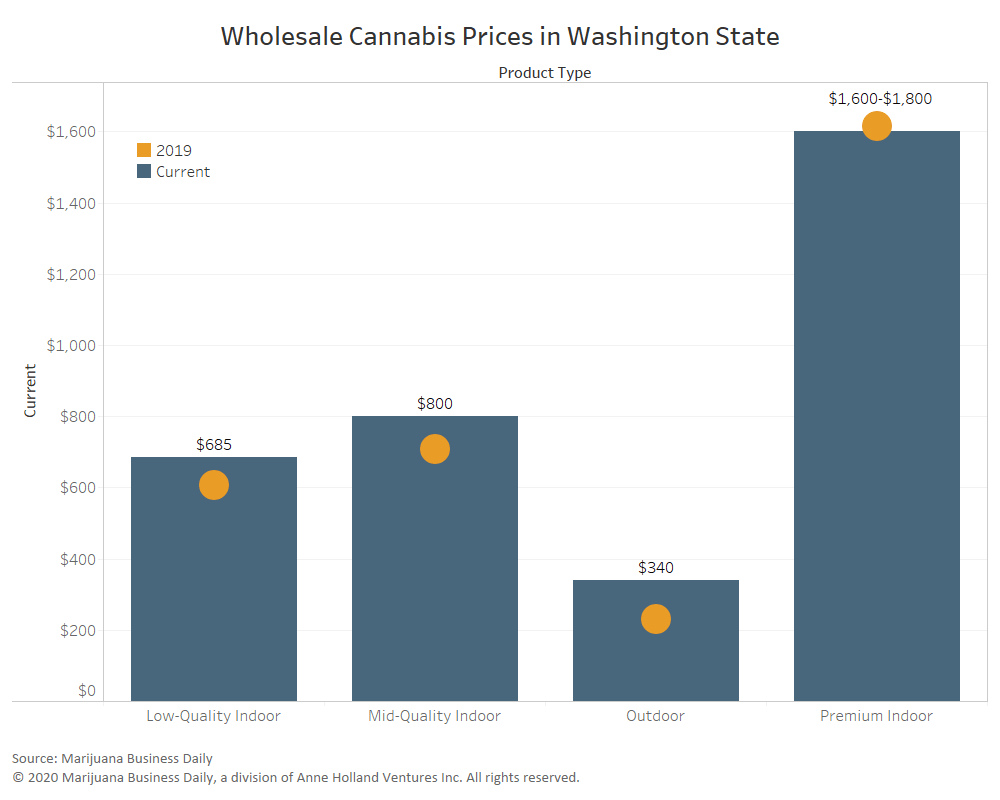[ad_1]

(This is the second in a series of stories from Marijuana Business Daily examining wholesale prices in U.S. recreational marijuana markets. Part 1 covered Nevada.)
Washington state’s wholesale cannabis flower market is experiencing rising prices, but marijuana business owners don’t expect that upward trend to last.
Growers throughout the state report that wholesale flower prices are averaging:
- $1,400 -$1,800 a pound for premium indoor (premium prices have held steady).
- $800 a pound for mid-quality indoor (up from $700 last year).
- $685 a pound for low-quality indoor (up from $600 last year).
- $340 a pound for outdoor designated for extraction (up from $227 last year).
Although Washington state has experienced oversupply challenges for several years and wholesale flower prices were once some of the lowest in the country, the market has experienced an increase in prices in the recent months for several reasons, including:
- Smaller operators have gone out of business because the market was too competitive and profit margins were unfavorable.
- With prices at rock bottom, some licensees chose not to grow cannabis at all, driving down supply.
- Poor weather conditions, including overcast summer months and early fall frosts, led to suboptimal outdoor crops in 2019.
Despite those factors, demand remains strong and some industry insiders expect that as prices creep back up, growers will utilize more of their canopy and many of the dormant licenses will be put back into production – causing supply to increase and putting downward pressure on prices.
“I really believe that this is the result of anomalous conditions that lined up to cause a real drop in production that we’re not going to see again,” said Micah Sherman, owner of producer/processor Raven Grass in Olympia.
Business attrition
With retail sales of recreational marijuana beginning in 2014 in Washington state, the market is one of the oldest in the United States, behind only Colorado. But the state over-licensed canopy to the point that the wholesale market became oversaturated years ago.
While demand has certainly grown since the market began, several growers say there is too much cannabis in production for the growers to succeed in the market.

Anders Taylor
“The Liquor and Cannabis Board (LCB) licensed way too much canopy,” said Anders Taylor, a cannabis grower in Okanogan County.
Taylor said the regulators “changed course” by saying they were going to limit canopy to around 2 million square feet but instead licensed up to 10 times that amount.
“It’s hard to stress how much of an impact that has had on the farmers,” he added.
Taylor said the state’s market was “hypercompetitive” for several years, as many of the small businesses got involved based on the original promises by the LCB to limit canopy.
“A bunch of people put in their life savings,” he said. “A lot of people lost their businesses.”
Sherman added that last year’s oversupplied market hitting “rock bottom” forced those businesses to give up.
“Most of those people have been forced to close their doors because of the commodification we’ve seen,” he said.

Jeremy Moberg
Jeremy Moberg, founder and CEO of CannaSol Farms in Riverside, said the rash of people losing their businesses was “the most brutal market correction possible.”
“People were not willing to walk away. It was extremely painful,” he added.
Moberg also considered quitting last year but had enough capital and biomass shored up to cover his bills until prices came back up.
Underused canopy
Another reason for the weakening of the oversupply came from growers choosing to stay on the sidelines.
“Some people chose not to plant because of how bad the pricing was last year,” Sherman said. “They were just going to sit this year out and see what happens.”
But, he reemphasized, the state still has 10 times more canopy licensed for production than is needed.
Shawn DeNae, a marijuana grower in Arlington, said more companies need to go out of business for the rest to succeed.

Shawn DeNae
Of the more than 1,300 total cannabis licenses, she said, less than 700 are selling into the market every month.
DeNae’s worried that licensees are sitting on their permits to either wait for the market to improve or for a change in the law to allow for outside investment, in which case, she fears licenses will be sold to out-of-state companies for pennies on the dollar.
When the LCB released its canopy report in 2019, it found that Washington state growers were using less than half of their allotted canopy.
“I believe those licenses (not producing) need to be forfeited,” DeNae said.
Moberg agrees that the unused licenses need to go away. But before that happens, he expects to see a ramp up in production to correspond with the rebounding prices and a market that will soon again become oversupplied – possibly as soon as next fall.
“I’m worried about the next round,” he said.
Bad weather
Jade Stefano, founder of Seattle-based producer/processor Puffin Farm, said yields were down 20%-30% from a normal year because of extended rainy, overcast and cool weather from June through August. Some plants reached only half the size of normal growth.
Then, two weeks before the fall harvest, there were “horrific,” sustained frosts, she added.
“The outdoor weather situation was the worst hit” to the supply, Stefano said. “A lot of potential was lost.”
Taylor said the poor weather – including temperatures that were lower than normal in the grow cycle – also caused immature flower that was more prone to mold.
Also on the horizon and on a lot of producers’ minds in Washington – are three bills currently before state lawmakers:
- SB 6085 and HB 2263, which call for removing barriers to capital for minority business owners and seek to eliminate a residency requirement for potential investors in the marijuana market.
- HB 2279, which is intended to strengthen the market for small cannabis farmers, improve transparency and educational opportunities for the public and establish a regulatory framework for future improvements to small, owner-.operated businesses.
Bart Schaneman can be reached at [email protected]
[ad_2]
Source link

































![Cannabidoil Oil Benefits | TFV4 Review [ Best Tank On The Market! ]](https://cbdnewsbreak.com/wp-content/uploads/2020/04/1586554093_1586553627_maxresdefault-80x60.jpg)





